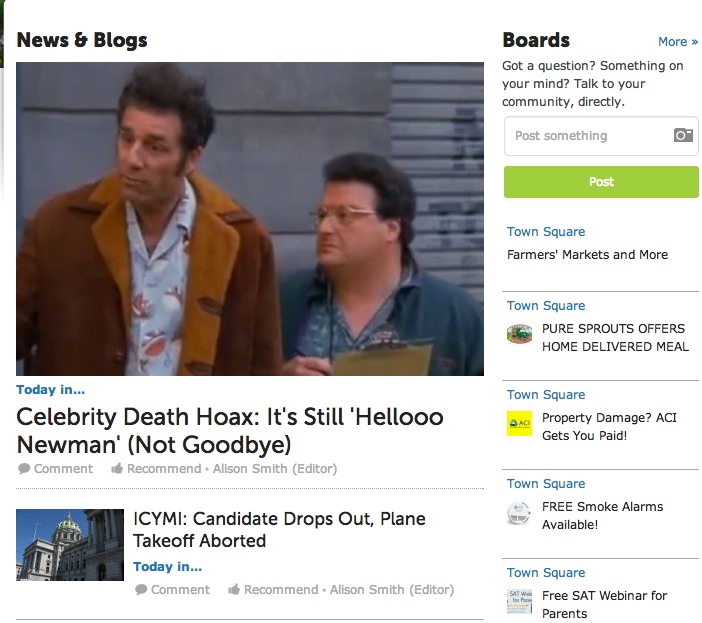FYI – In these previews I may indicate thoughts on an issue, but it in no way means my mind is set. During a critical hearing for the Jaindl issue, a Commissioner spoke before public comment outlining he was voting to move forward the project regardless of what people said during public comment. That was wrong. Public debate was circumvented when the Commissioner indicated his mind was made up.
My hope is by blogging I open the door for conversations. One of my biggest issues with the Jaindl debacle was folks didn’t truly understand what was happening until it was “too late”. I plan on doing everything I can to make sure residents have background information on issues. This is one mechanism to do that. I hope people find it useful. Please contact me at ronbeitler@gmail.com if you have any questions or concerns about any issues.
Another light agenda this week. Most committees are meeting for the first time since reorganization last week, this week and next week. The next meeting will likely be a beefier one.
Announcements & Presentations – None
Hearings & Approvals – None
Public Comment on non-agenda items
-Two statements of interest for Zoning Hearing Board. (What is zoning hearing board?) Folks interested can still apply. Apply here.
-Two statements of interest for Audit Advisory Board and one for Public Safety Commission.
-LMT Planning Commission – Recommendation for BOC approval to create a steering committee to establish a Capital Planning roadmap modeled after Penndot’s 12 year plan. A capital improvement plan is a tool used to assess the long term capital project requirements of a government entity. The purpose for LMT is to evaluate requests for capital items such as maintenance of parks, trails, sanitary sewer, storm water management, open space preservation, public works and fire equipment. The written plan would hopefully identify and describe capital projects requests,rank priority, forecast the years in which funding each project is to occur and methods of funding. I support this initiative. Without a long term capital projects roadmap smart growth planning is incomplete. At it’s core, smart growth is important because it lays out a sustainable financial roadmap for our township. Planning ahead for capital needs is critical.
There are 3 letters dealing with snow removal this week. 1 suggestion, 1 complimentary and 1 complaint.
1 request for installation of walking path at Church Lane Park. (see above capital improvements planning!)
Lastly, we have a letter from a resident concerned with tractor trailers turning right onto East Texas Rd. off of Brookside. This is a major concern. One of the biggest priorities over the next 4 years is establishing how we’re going to proactively deal with Tractor Trailer traffic in the township. With the proliferation of warehousing in the township due to the unfortunate tragic rezoning of 100’s of acres of farmland to industrial we face no bigger safety and quality of life issue. I consider this a planning, public works and public safety issue.
Appointments to Boards – None
Planning: Approved MS4 Permit. OVERVIEW: The federal Clean Water Act prohibits the discharge of pollutants into waterways without the appropriate permits. Pennsylvania’s Stormwater Management Act MS4 Program, Chapter 102, and NPDES Permit Program for Stormwater Discharges Associated with Construction Activities are amongst the Commonwealth’s methods for meeting the runoff-related requirements of the Clean Water Act. For all practical purposes, though, implementation of stormwater management efforts in Pennsylvania occurs at the community level because individual municipalities are ultimately responsible for adopting zoning ordinances, subdivision and land development regulations, and other programs that keep their locality’s runoff under control. Note: this is an area I am familiar with but need more information about. I will hopefully be meeting with staff tomorrow for a primer on this subject prior to the BOC meeting.
There will be a joint workshop of the Planning Commission and Board of Commissioners on Feb 18th. I will post the agenda when it is set.
Committees: Here is a link to a list of committees & corresponding responsibilities.
At first meetings of the year the Committees will be establishing goals for the year. This was a request by President Conrad. I will outline these goals in a future blog post.
Planning & Zoning – The planning and zoning committee will meet Feb 12th.
The planning commission has nominated Barry Isett and Associates to conduct the East Texas comprehensive planning. We rec’d a 10,000 matching grant from the county to pay for this. The purpose of this study is to explore zoning and planning options for the East Texas area of the township.
We will explore adopting a new Village Zoning District for East Texas that allows a mix of lower-intensity commercial and residential uses. The idea is to use Traditional Neighborhood Development principles as part of infill construction or any redevelopment of parts of any portion of Day-Timers not utilized by a future tenant. Zoning should help preserve and enhance the historic character and walkability of the village.
These concepts as they relate to LMT are also outlined in the townships draft smart growth plan.
Authorize to advertise: Ordinance prohibiting trucks beyond scenic view on Gehman Rd. I want to see where the signs will be placed. I believe it’s important to avoid signage placed in a way that we encourage trucks to use Scenic View (through a residential neighborhood) as an “out” when they realize they cannot proceed further towards Mountain Rd.
Approval of Street Sweeper and Truck Bid: This is to replace public works equipment. This was reviewed by the prior board as a part of the 2014 budget process.
Work order process for engineering projects: This came out of a recommendation by the Audit Advisory Board to review internal policies for engineering projects.
Review Board/Commission appointment policy regarding the need to interview incumbents. I feel strongly that incumbents should interview each time they are up for re-appointment. Some boards (such as zoning hearing board and planning commission) have people turned away due to lack of open spots. Appointments can sometimes be for up to 4 year terms. I absolutely think incumbents should re-apply for open positions and be interviewed in person at a public meeting.









